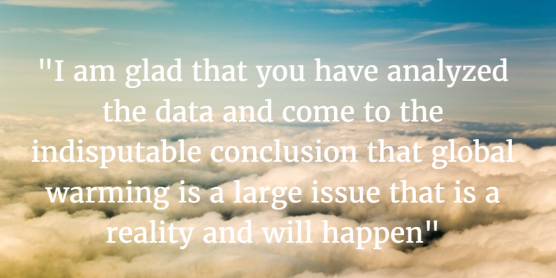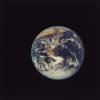Dear Mr. Lomborg,
This letter is in regards to your opinion article in The Wall Street Journal on Thursday, April 7, 2016, titled, “An Overheated Climate Alarm.”
I fully understand what you are saying as far as the positive effects that an increased temperature in our troposphere will produce — fewer people will get the cold, and fewer people will in turn die. With the data that you have laid out on the table, this seems like a valid and indisputable conclusion — but the data that you are referring to only tells a fraction of the story, and in that case you are still correct in your reasoning; but a larger “judgement” call looms ahead.
I am glad that you have analyzed the data and come to the indisputable conclusion that global warming is a large issue that is a reality and will happen. There is a good Indian proverb about what you are experiencing:
It is a story of a group of blind men who touch an elephant to learn what it is like. Each one feels a different part, but only one part, such as the side, or tusk, or ears. They then compare notes and learn that they are in complete disagreement. "The blind man who feels a leg says the elephant is like a pillar; the one who feels the tail says the elephant is like a rope; the one who feels the trunk says the elephant is like a tree branch; the one who feels the ear says the elephant is like a hand fan; the one who feels the belly says the elephant is like a wall; and the one who feels the tusk says the elephant is like a solid pipe (Jain Version).”
You are feeling only one part of the elephant, and this is a problem because the larger picture is much more important than our everyday struggle with the cold. Even if warming will, “save as many as, 85,000 lives a year…,” it will be at the cost of over 100 million people dying by the end of 2030 — and that was a number agreed upon by over 20 countries. But even that number is up for debate: 250 million people may die with sea levels rising, 30 million with extreme weather and flooding, and 5 million people with desertification, all by the end of 2030 - the second edition of the Climate Vulnerability Monitor.
I can see how you arrived at your conclusion, but your only looking at one part of the metaphoric elephant — there is a much larger judgment call to make: 85,000 lives saved each year from a cold we have been fighting for years, or 6 million deaths each year from climate change (something that you do not deny), a threat we have never faced.
Your logic breaks down in your conclusion — is climate change good or bad?
I would love to hear your response and maybe start a scholarly debate on the matter.
With respect,
Andrei Doroshin
















